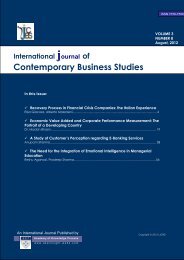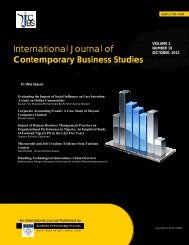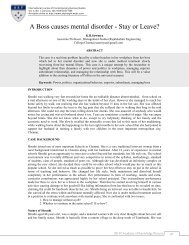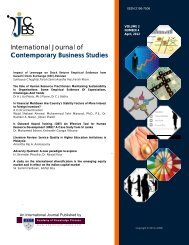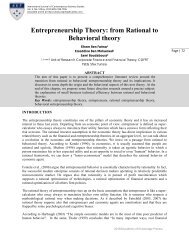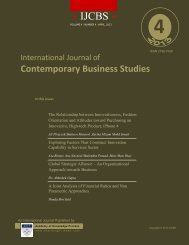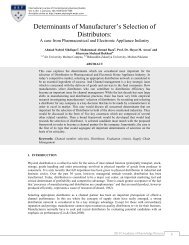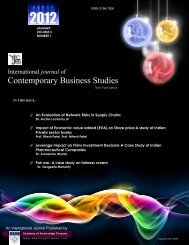Contemporary Business Studies - Academy of Knowledge Process ...
Contemporary Business Studies - Academy of Knowledge Process ...
Contemporary Business Studies - Academy of Knowledge Process ...
You also want an ePaper? Increase the reach of your titles
YUMPU automatically turns print PDFs into web optimized ePapers that Google loves.
International Journal <strong>of</strong> <strong>Contemporary</strong> <strong>Business</strong> <strong>Studies</strong>Vol: 4, No: 2. February, 2013 ISSN 2156-7506Available online at http://www.akpinsight.webs.comDeloitte Forensic Center (2011), “Fraud, Bribery and Corruption Practices Survey,” available athttp://www.deloitte.com.DiGabriele, J.A. (2008), ‘An Empirical Investigation <strong>of</strong> the Relevant Skills <strong>of</strong> Forensic Accountants,’Journal <strong>of</strong> Education for <strong>Business</strong>, pp. 331-338.DiGabriele, J.A. (2009), “Implications <strong>of</strong> Regulatory Prescriptions and Audit Standards on the Evolution<strong>of</strong> Forensic Accounting in the Audit <strong>Process</strong>”, Journal <strong>of</strong> Applied Accounting Research, Vol. 10,Issue: 2, pp. 109 – 121.Ekeigwe, C. (2011), “Fraud Risk Management,” a paper presented at the Institute <strong>of</strong> CharteredAccountants on Nigeria Forensic Certification Training Program held on August 11-12, 2010 atSharon Ultimate, Abuja.Ernst & Young, (2009), “Detecting Financial Statement Fraud: What Every Manager Needs to Know,”E&Y LLP, pp.1-8. Available at www.ey.com.Efiong, E.J. (2012), “Forensic Accounting Education: An Exploration <strong>of</strong> Level <strong>of</strong> Awareness inDeveloping Economies,” International Journal <strong>of</strong> business and management, Vol. 7, No. 4, pp.26-34.Fortin, A. and Legault, M. (2010), “Development <strong>of</strong> Generic Competencies: Impact <strong>of</strong> a Mixed TeachingApproach on Students’ Perceptions,” Accounting Education: an international journal, Vol. 19,nos. 1-2, pp. 93-122.Grippo, F.J. and Ibex, T. (2003), “Introduction to Forensic Accounting,” The National Public Accountant,Vol. 4, June 4-8.Groomer, S. M., and Heintz, J. (1994), “A survey <strong>of</strong> advanced auditing courses in the United States andCanada,” Issues in Accounting Education, Volume 9, no.1 (Spring), pp. 96–108.Transparency International (2011), “Global Corruption Report,” published by Earth Scan Limited,London. Available at www.transparency.ch.Golden, Thomas W., Skalak, Steven L., and Clayton, Mona M., (2011) “A Guide to Forensic AccountingInvestigation,” 2 nd edition, John Wiley & Sons, New Jersey. 2011.Harris, C.K. and Brown, A.M. (2000), “The Qualities <strong>of</strong> a Forensic Accountant,” Pennsylvania CPAJournal, Vol. 71, issue 1, pp. 2-3.Hassall, T. J., Joyce, J. L., Montano, A. and Anes, J. A. D. (2005), “The Vocational Skills Gap forManagement Accountants: the Stakeholders’ Perspectives,” Innovations in Education andTeaching International, Vol. 40, no. 1, pp.78-88.Hogan, C.E. Rezaee, Z., Riley, R.A. and Velury, U.K. (2008), “Financial Statement Fraud: Insights fromthe Academic Literature,” Auditing: a journal <strong>of</strong> practice and theory, Vol. 27, no. 2, pp. 231-252.Jones, M. (2011), ‘Creative Accounting, Fraud and International Accounting Standards,’ John Wiley &Sons, London.KPMG (2009), “The US Fraud Survey 2009”. New York, KPMG Peat Marwick Available atwww.kpmginstiutes.com.KPMG (2012), “KPMG India Fraud Survey 2012,” available at www.kpmginstitutes.com.Lee, D., and C. Blaszczynski (1999), “Perspectives <strong>of</strong> Fortune-500 Executives on the CompetencyRequirements <strong>of</strong> Accounting Graduates,” Journal <strong>of</strong> Education for <strong>Business</strong>, Vol. 75, no. 2, pp.104-107.McMullen, D.A. and Sanchez, M.H. (2010), “A Preliminary Investigation <strong>of</strong> the Necessary Skills,Education Requirements, and Training Requirements for Forensic Accountants,” Journal <strong>of</strong>Forensic & Investigative Accounting, Vol. 2, Issue 2, pp. 30-48.Messmer, M. (2004) “Exploring Options in Forensic Accounting,” National Public Accountant, vol. 5(3),Dec/Jan, pp. 19-20.Murphy, P.R. and Dacin, M.T. (2011), “Psychological Pathways to Fraud: Understanding and PreventingFraud in Organizations,” Journal <strong>of</strong> business ethics, Vol. 101, issue 4, pp. 601-618.Muehlmann, B.W., Burnaby, P. and Howe, M. (2012), “The Use <strong>of</strong> Forensic Accounting Experts in TaxCases as Identified in Court Opinions,” Journal <strong>of</strong> Forensic& Investigative Accounting, Vol. 4,Issue 2, pp. 1-33.2013©<strong>Academy</strong> <strong>of</strong> <strong>Knowledge</strong> <strong>Process</strong>85



